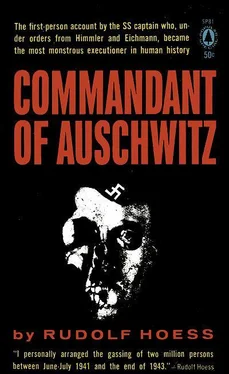Even Berliners, who are not so easily got down, were in the end worn out. Day after day and night after night their nerves were strained in the cellars and shelters.
This war of nerves, this psychological battering, could not have been borne by the German people for very much longer.
I have sufficiently described the activities of Department DI, the Inspectorate of Concentration Camps, in my description of the departmental heads and of the various officials. [94]
I have nothing to add to these portraits.
Would the concentration camps have been organized differently under another inspector? I think probably not. For nobody, however energetic and strong-willed, could have dealt with the conditions created by the war, and none could have successfully opposed the inflexible will of the Reichsführer SS. No SS officer would have dared to act against, or to circumvent, the intentions of the Reichsführer SS. Even when the concentration camps were being created and set up by a man as strong-willed as Eicke, the voice of the Reichsführer SS was always the real and decisive power behind him.
The concentration camps became what they were during the war entirely and solely because such was the intention of the Reichsführer SS. It was he who issued the directives to the Reich Security Head Office, and he alone could do so. The Reich Security Head Office was a purely executive body. I firmly believe that not a single important large-scale action by the Security Police was inaugurated without the prior approval of the Reichsführer SS. In most cases he was both the proposer and the instigator of such actions. The entire SS was the tool which Heinrich Himmler, the Reichsführer SS, used in order to realize his will.
The fact that from 1944 on he had to compete with a force stronger than himself, namely the war, in no way affects the truth of this statement.
During my official tours of the arms factories where prisoners were employed, I obtained an insight into our armaments production. I saw, and also heard from the works managers, a great deal that truly astounded me. Especially in the airplane industry. From Maurer, who often had to deal with the Armaments Ministry, I heard of delays that could never be made good, of large-scale failures, of mistakes in planning which took months to put right. I knew of cases where well-known and important figures in the armaments industry were imprisoned and even executed, because of failure. This gave me a lot to think about.
Although our leaders were continually talking about new inventions and new weapons, these produced no visible results in the actual conduct of the war. In spite of our new jet fighters, the weight of the enemy air offensive continued to increase. A few dozen fighter squadrons were all we had to send up against streams of bombers consisting of anything up to two and a half thousand heavy machines.
Our new weapons were in production and had even been tested in action. But to win the war, a new system of armaments production must be created. Whenever a factory was mass-producing a finished article at full speed, it was likely to be leveled to the ground in the space of a few minutes. The transfer underground of the factories manufacturing the “decisive” weapons was not envisaged before 1946 at the earliest. Even then nothing would be accomplished, because the supply of raw materials and the removal of the finished product would, as before, be at the mercy of the enemy air force.
The best example of this was the manufacture of V-weapons at Mittelbau. The bombers destroyed the whole of the permanent system of roads within miles of the workshops hidden in the mountains. Months of painstaking work were thus rendered vain. The heavy V-1s and V-2s were immobilized in the hillsides. No sooner were temporary tracks laid than they, too, were destroyed.
By the end of 1944 it was the same story everywhere.
The Eastern front was continuously being “withdrawn” and the German soldier in the East no longer stood firm. The Western front, too, was being forced back.
Yet the Führer spoke of holding firm at all costs. Goebbels spoke and wrote about believing in miracles. Germany will conquer!
For my part I had grave doubts whether we could win the war. I had seen and heard too much. Certainly we could not win this way. But I dared not doubt our final victory, I must believe in it. Even though sturdy common sense told me plainly and unambiguously that we must lose. My heart clung to the Führer and his ideals, for those must not perish.
My wife often asked me during the spring of 1945, when everyone saw that the end was coming: “How on earth can we win the war? Have we really got some decisive weapon in reserve?” With a heavy heart I could only say that she must have faith, for I did not dare tell what I knew. I could not discuss with anyone what I knew, and what I had seen and heard. I am convinced that Pohl and Maurer, who both saw more than I did, had the same thoughts as I. But no one dared talk about this to anyone else. This was not so much because they feared being charged with spreading despondency, as because nobody wished to believe what he knew was in fact the truth. It was impossible that our world should perish. We bad to win.
Each of us worked on with bitter determination, as though victory depended on our labors. And when, in April, the Oder front collapsed, we devoted the greatest effort to keeping the prisoners at full pitch in the war factories that still remained to us. We used every means in our power. We even considered turning out emergency war materials in our extremely primitive substitute camps. Any man in our sphere who neglected his work on the grounds that it did not matter any more was roughly dealt with. Maurer wished a member of his staff brought before an SS court-martial on this account, even though Berlin was already encircled and we were preparing to pull out.
I have referred on many occasions to the mad evacuation of the concentration camps.
The scenes I saw, and which resulted from the evacuation order, made such an impression on me that I shall never forget them.
When Pohl received no further reports from Baer during the evacuation of Auschwitz, he sent me posthaste to Silesia to put matters in order. I first found Baer at Gross-Rosen, where he was making preparations for the reception of the prisoners. [95]
He had no idea where his camp might be wandering. The original plan had had to be scrapped because of the Russian push to the south. I immediately drove on, in the hope of reaching Auschwitz in time to make sure that the order for the destruction of everything important had been properly carried out. But I was only able to get as far as the Oder, near Ratïbor, for the Russian armored spearheads were already fanning out on the far side of that river.
On all the roads and tracks in Upper Silesia west of the Oder I now met columns of prisoners, struggling through the deep snow. They had no food. Most of the noncommissioned officers in charge of these stumbling columns of corpses had no idea where they were supposed to be going. They only knew that their final destination was Gross-Rosen. But how to get there was a mystery. On their own authority they requisitioned food from the villages through which they passed, rested for a few hours, then trudged on again. There was no question of spending the night in barns or schools, since these were all crammed with refugees. The route taken by these miserable columns was easy to follow, since every few hundred yards lay the bodies of prisoners who had collapsed or been shot. I directed all the columns I could reach to go westward, into the Sudetenland, so as to avoid the, incredibly chaotic bottleneck near Neisse. I gave strict orders to the men in charge of all these columns that they were not to shoot prisoners incapable of further marching. They were to hand them over in the villages to the Volkssturm. [96]
Читать дальше












